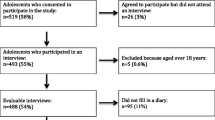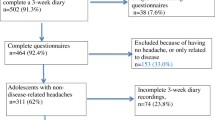Abstract
The present study was concerned with whether children's responses to a questionnaire correspond with parents' reports of the child's headache symptoms and whether these responses correlate with self-monitored headache activity. Twenty-eight children, ages 7 years–16 years, participated in the study. Using a questionnaire format, data on a wide variety of headache characteristics were gathered from parents and children. During the subsequent 4 weeks, children monitored their headache activity and medication usage. Results were generally supportive of the validity and reliability of children's reports via a questionnaire format. The responses to the frequency of headache and medication usage were found to predict the responses over the next month, whereas the response on the duration of headache did not. Significant correlations for most headache-symptom items indicated that children and parents agree on their presence and severity. This investigation is the first step in developing a systematic assessment procedure for childhood headache.
Similar content being viewed by others
References
Blanchard, E. B., Theobald, E. E., Williamson, D. A., Silver, B. V., & Brown, D. (1978). Temperature biofeedback in the treatment of migraine headaches.Archives of General Psychiatry, 35, 581–588.
Hoelscher, T. J., & Lichstein, K. L. (1984). Behavioral assessment and treatment of child migraine: Implications for clinical research and practice.Headache, 24, 94–103.
Joffe, R., Bakal, D. A., & Kaganov, T. (1983). A self-observation study of headache symptoms in children.Headache, 23, 20–25.
Labbé, E. E., & Williamson, D. A. (1984). Treatment of children's migraine using autogenic feedback training.Journal of Consulting and Clinical Psychology, 52, 968–976.
Leviton, A., Slack, W. V., Masek, B., Bana, D., & Graham, T. R. (1984). A computerized behavioral assessment for children with headaches.Headache, 24, 182–185.
Richardson, G. M., McGrath, P. T., Cunningham, S. T., & Humphreys, P. (1983). Validity of the headache diary for children.Headache, 23, 184–187.
Sargent, T. D., Green, E. E., & Walters, E. D. (1973). Preliminary report on the use of autogenic feedback training in the treatment of migraine and tension headaches.Psychosomatic Medicine, 35, 129–135.
Author information
Authors and Affiliations
Rights and permissions
About this article
Cite this article
Labbé, E.E., Williamson, D.A. & Southard, D.R. Reliability and validity of children's reports of migraine headache symptoms. J Psychopathol Behav Assess 7, 375–383 (1985). https://doi.org/10.1007/BF00960710
Accepted:
Issue Date:
DOI: https://doi.org/10.1007/BF00960710




